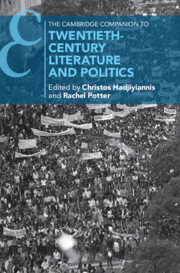Book contents
- The Cambridge Companion to Twentieth-Century Literature and Politics
- The Cambridge Companion to Twentieth-Century Literature and Politics
- Copyright page
- Contents
- Figures
- Notes on the Contributors
- Acknowledgements
- Chronology
- Introduction Literature and Politics
- Part I 1900–1945: Ideas and Governance
- Chapter 1 Liberalism
- Chapter 2 Communism
- Chapter 3 Fascism
- Chapter 4 Suffragism
- Chapter 5 Pacifism
- Part II 1945–1989: New Nations and New Frontiers
- Part III 1989–2000: Rights and Activisms
- Further Reading
- Index
- Cambridge Companions To …
Chapter 2 - Communism
from Part I - 1900–1945: Ideas and Governance
Published online by Cambridge University Press: 01 December 2022
- The Cambridge Companion to Twentieth-Century Literature and Politics
- The Cambridge Companion to Twentieth-Century Literature and Politics
- Copyright page
- Contents
- Figures
- Notes on the Contributors
- Acknowledgements
- Chronology
- Introduction Literature and Politics
- Part I 1900–1945: Ideas and Governance
- Chapter 1 Liberalism
- Chapter 2 Communism
- Chapter 3 Fascism
- Chapter 4 Suffragism
- Chapter 5 Pacifism
- Part II 1945–1989: New Nations and New Frontiers
- Part III 1989–2000: Rights and Activisms
- Further Reading
- Index
- Cambridge Companions To …
Summary
Some of the most celebrated writers of the 1930s generation dabbled with Marxist politics, but later renounced their earlier political commitments. A Cold War critical consensus emerged that saw Communism and its socialist realist theory of art as deadening forces, that were incompatible with good writing. Shifting the focus to some less canonical figures, the chapter sees the relationship between Communism and literature in the 1930s as a more productive one. The chapter focuses on three ‘conversion narratives’, whose protagonists move from false consciousness to political commitment: Sylvia Townsend Warner’s Summer Will Show, Mulk Raj Anand’s Untouchable, and Lewis Grassic Gibbon’s A Scots Quair. These novels have complicated relationships to socialist realism. They want to cut through ideological fog and to see ‘reality as it is’ and ‘whither it is moving’ (in Radek’s phrase), but they use modernist literary techniques to this end, and grapple with epistemological doubt. They also complicate the traditional Marxist emphasis on class by putting it into dialogue with gender, sexuality, race, national identity, and rural identity.
Keywords
- Type
- Chapter
- Information
- Publisher: Cambridge University PressPrint publication year: 2022
- 1
- Cited by

